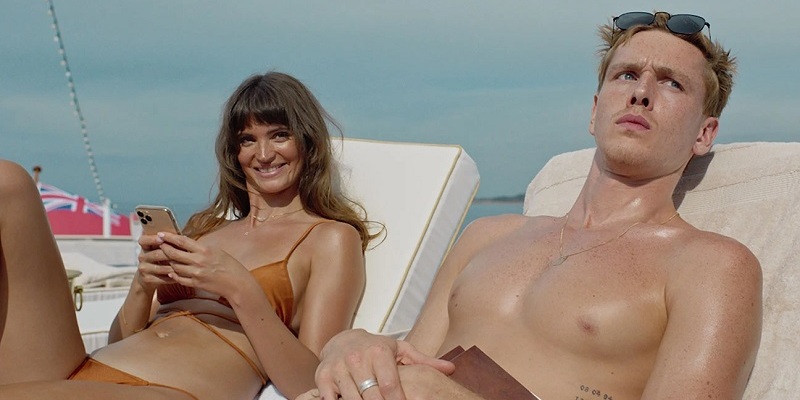
Review by
Eric Hillis
Directed by: Ruben Ostlund
Starring: Harris Dickinson, Charlbi Dean, Dolly de Leon, Zlatko Burić, Henrik
Dorsin, Vicki Berlin, Woody Harrelson

Ruben Ostlund's Triangle of Sadness plays like a
mash-up of the themes of the Swedish director's previous two movies.
Like 2014's
Force Majeure, it's centred around a bickering, holidaying young couple. Where he
skewered the art world and its denizens in 2017's
The Square, here he takes on a similarly out of touch group – the uber-rich
passengers on a luxury cruise (the lavish yacht used for filming was
once owned by Aristotle Onassis and Jackie Kennedy).

Twentysomething models Carl (a revelatory comic performance
from Harris Dickinson) and Yaya (Charlbi Dean, who
sadly passed away following production) have a relationship that the
latter views as largely one of convenience (she readily admits her goal
is to become a trophy wife) while the former wishes it to become
something more substantial. The film's opening act is largely centred
around an argument over Yaya's habit of dodging bills, a scuffle that
begins in a restaurant and follows the pair back to their hotel room.
The sequence is brilliantly written and played, the sort of
realistically messy set-to that Turkish filmmaker Nuri Bilge Ceylan has
become the modern master of in recent years.
As "influencers", Carl and Yaya don't make much money, but they do get
a lot of "free stuff," including a trip on the aforementioned luxury
yacht. The bickering continues as Carl grows jealous of the hunky crew
members Yaya flirts with, and the two spend much of the time mingling
with other guests. Their fellow passengers include Dmitry (Zlatko Buric), a Russian oligarch who boasts that he "sells shit (fertiliser)" and
likes to quote Reagan and Thatcher when drunk; a disabled German woman
(Iris Berben) who can only utter the words "In Den Wolken (In the
Clouds)"; an exceptionally dull software magnate (Henrik Dorsin);
a Scandinavian Karen (Mia Benson) who insists the ship's sails
need cleaning, despite the awkward fact that the ship is fully motorised
and thus possesses no sails; and Clementine (Amanda Walker) and
Winston (Oliver Ford Davies), a doddery old British couple who
made their fortune from manufacturing hand grenades (which later plays
into the movie's most laugh out loud moment).

The yacht is home to something of a three-tiered society. The wealthy
guests are pampered by an army of glamorous mini-skirted stewardesses
while a crew of mostly Asian workers labour below decks, cleaning,
maintaining and cooking, while all are overseen by a drunken captain (Woody Harrelson). In the film's third section, this society is flipped on its head
when various passengers, staff and labourers find themselves
shipwrecked, with the rich folk clueless as to how to survive while
Abigail (Dolly de Leon), a Filipina toilet cleaner, assumes the
role of de facto leader.
Some have criticised Ostlund for lazily targeting elites, but a) his
film isn't as black and white as that, and b) they deserve it. Ostlund
isn't simply calling these people out as assholes – some of them come
off as rather endearing in their own deluded way – he's using their very
status as instruments of comedy. I generally abhor toilet humour, but
there's an incredibly constructed sequence in which the guests dine
during a raging storm and end up vomiting and defecating all over
themselves and each other. What's funny about the scene isn't its
crudeness, but the people involved. Like a reverse Salo, it's hilarious to watch all these prim and proper people who obsess
over their appearance be degraded in such a way. An extra layer of
comedy comes from how the staff attempt to pretend there's nothing crazy
about this scenario, continuing to serve fine food while the guests
succumb one by one to the fury of the restless sea.

The first two chapters of Ostlund's film are peppered with hilarious
vignettes, but things do grind to something of a halt in the final
shipwreck sequence. Ostlund never quite mines this scenario for the sort
of insight it might provide. With Abigail wielding her newfound power
and becoming a cross between Mussolini and Harvey Weinstein (trading
pretzels for sex with Carl), Ostlund suggests that it's not so much
money that turns people into monsters, but rather currency, whether
that's in the form of banknotes, high cheekbones or a stash of
pretzels.

